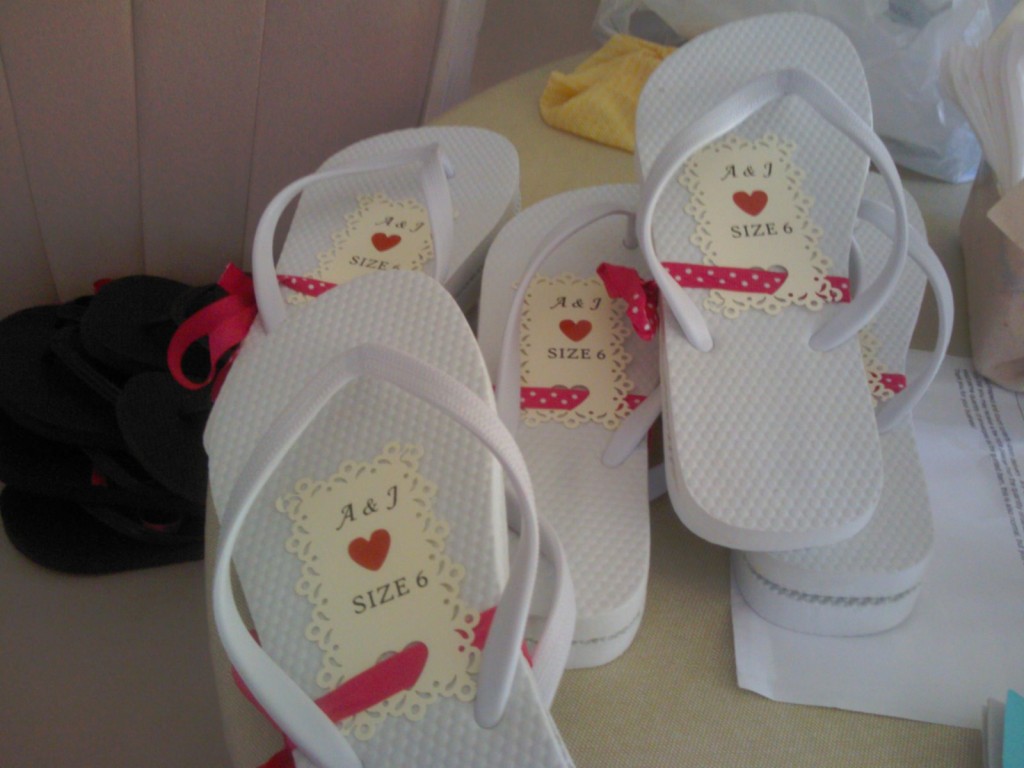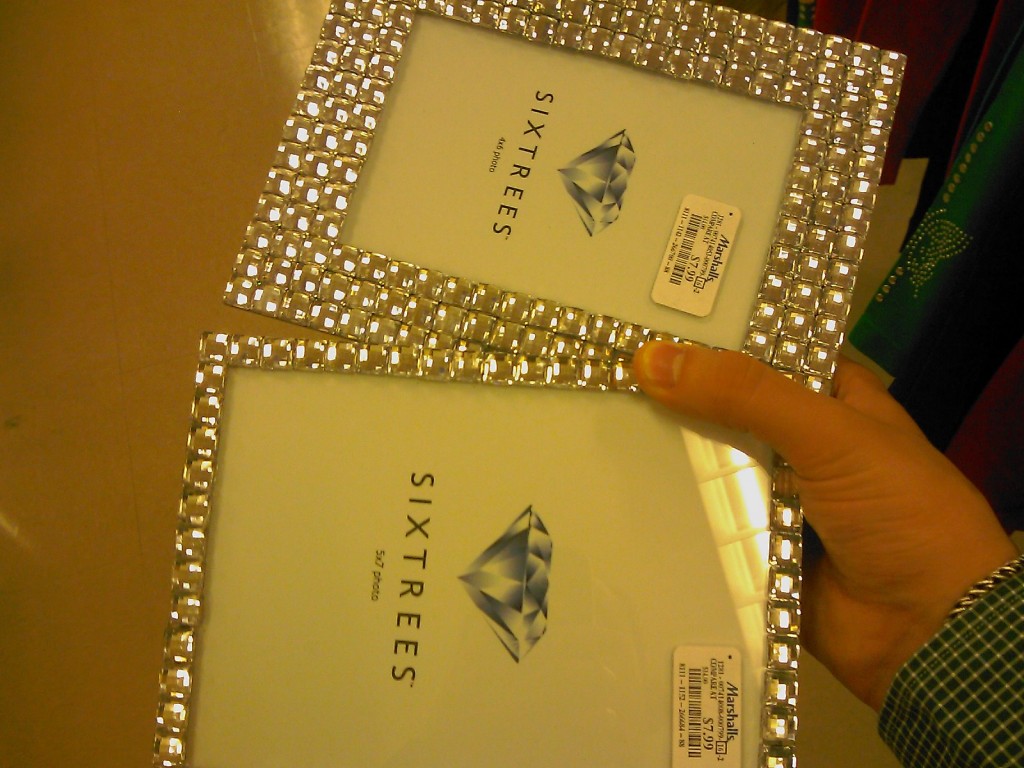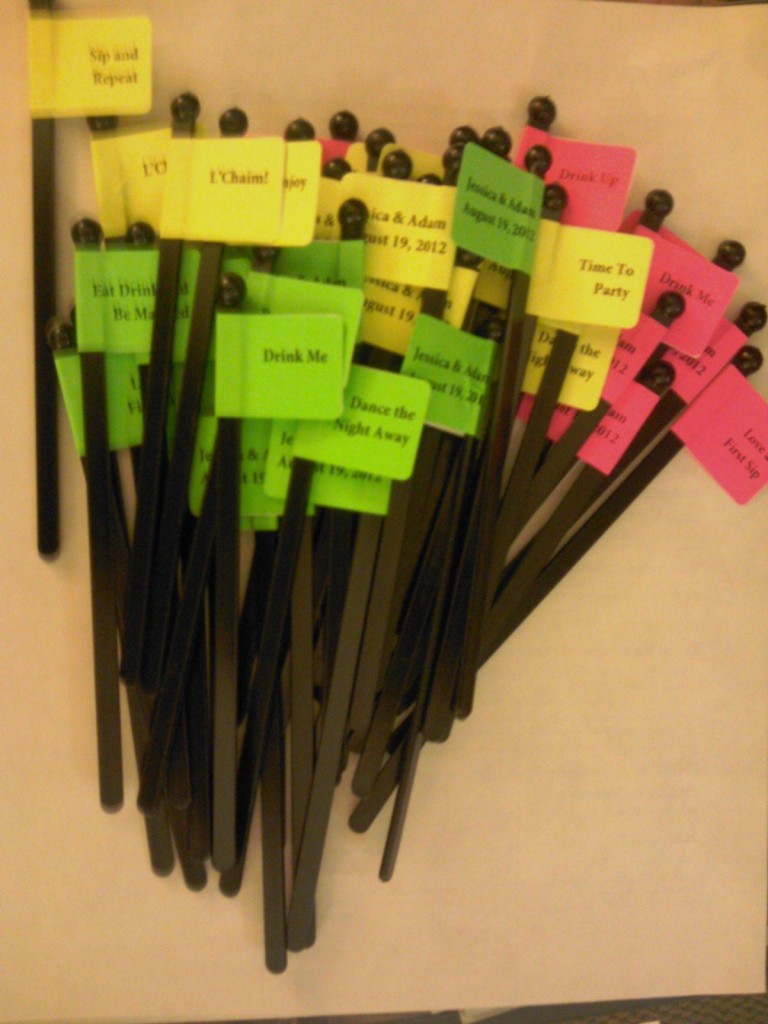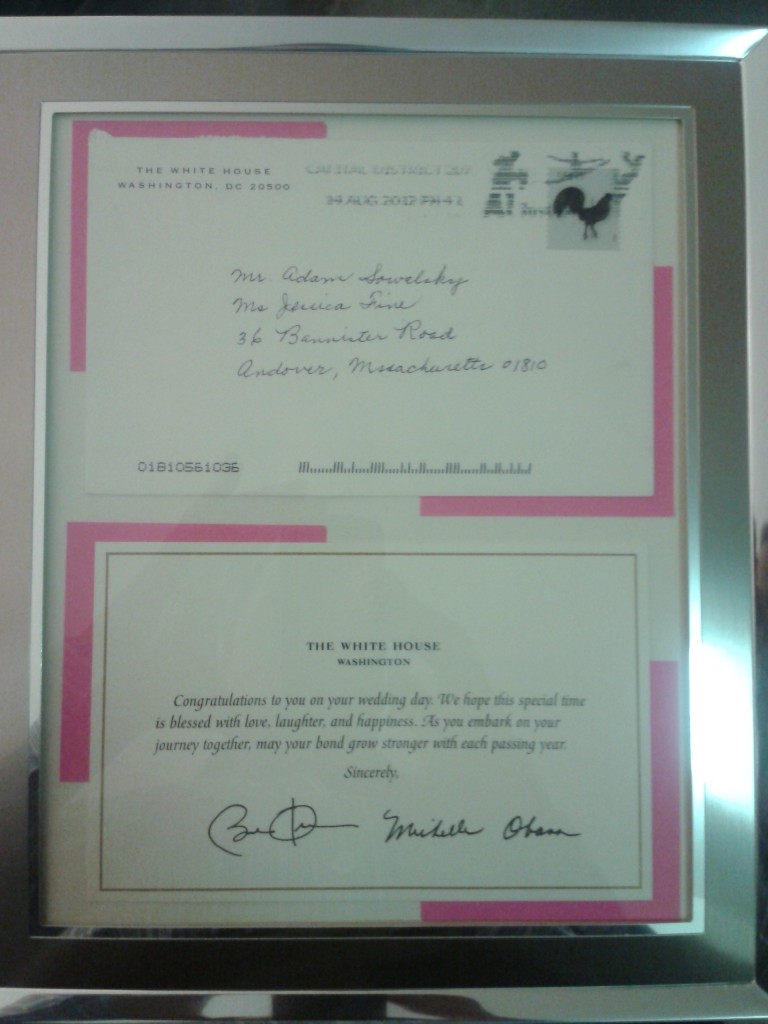We’re back from our honeymoon and we can’t believe we’ve been married for nearly a month. Between my teaching duties, Jessica’s new Ph.D. program, both of our respective jobs and tackling this huge pile of thank-you notes, we’re still very much carrying this amazing wedding spirit as long as possible.
So much preparation went into every detail of the wedding, but in order to surprise you with them, we were forced to keep secrets from you. For example, you may have noticed that many of the ladies were wearing black or white flip-flops! Was it a conspiracy? No, my dear gentlemen friends. There were indeed flip-flops in the ladies’ restroom. Here’s a picture of us assembling the various sizes of flip-flops in a picture dated July 23, 2011 (yes, over a year in advance).
And those crystal table frames? We loved them so much we bought as many as we could find lest the stores run out of them. (As it turned out, we found dozens the week before the wedding.) But here you can see the fruits of our hunt in a picture dated June 15, 2011 (again, more than a year in advance).
Did you enjoy our signature drinks? Hopefully they came with one of our swizzle sticks. Collect all ten, each with a different wedding or drink-themed quip (picture dated September 26, 2011)!
But not everything could be completed this far in advance, though. In my post on the wedding day, I alluded to a final item on our check list. We had invited the President of the United States and the First Lady to our wedding, with the understanding that if they can’t come they’d send us a nice note. The remaining item on our list was to frame that note and show off the note at the wedding. Well, that note never arrived until August 18! So at midnight on the day of the wedding I was assembling the letter from President Obama into a frame. It was on the table with the name cards, in case you missed it.
And finally, just before our wedding ceremony, the Tisch that I hosted was so spirited and so participatory that I never got past the first 2 paragraphs of the speech I had prepared! Therefore, I’m posting it here so I can share it with you all. Enjoy.
Welcome and thank you all for coming. It has been wonderful to see you all here and I have to give a special thank you to all of my friends and family who have helped prepare me for this really amazing day. You may not know this but Jessica and I have been engaged since last April – that’s 16 months if you’re counting. I guess as far as engagements go that may be fairly average now but a lot can happen in 16 months. Births, deaths, simcha and tsuris. But in the end, the engagement ends today on a very happy note – that Jessica and I are getting married! And this is an outcome I am delighted to celebrate with you today.
I think everyone here knows that I’m a scientist – and in science we think about the outcome, or consequence of any action. In physics, you know that what goes up must come down. In biochemistry we know that what goes into a reaction must come out of a reaction. Well, today, my wedding is the reaction, Jess and I as individuals are going into it and coming out, but as a product we’re a married couple – that is the outcome.
Thinking about outcomes today is especially relevant to the Torah portion for this week, which is parshat Shoftim. Shoftim, which is in the book of Deuteronomy, discusses the laws regarding the placement of judges, and the pursuit of justice through many laws or commandments that are described in Shoftim. It is in Shoftim that we learn the famous law of reciprocity: eye for an eye, tooth for a tooth. But aside from this brutal form of punishment there may be better lessons for a newly-married man to glean from the scripture. For example, it is written in Chapter 20 verse 10: Ki tikrav el ir l’hilachem aleha v’karata eileha l’shalom. Translated this means “When you approach a city to wage a war against it, first propose peace to it.†It’s a very thought-provoking perspective that can be applied to almost everything in life. I’m going to come back to this in just a moment.
Two weeks ago, I completed a seven-and-a-half-year study called Daf Yomi, a daily commitment to read 1 page of the Talmud per day. The Talmud, a 2700-page dissertation on Jewish law permitted me the opportunity to read the Jewish oral law as its been studied and interpreted by the Rabbis over the centuries. I’ve joked that the commitment of Daf Yomi has prepared me for the commitment of marriage, but it really gave me insights into how ancient texts can be re-interpreted to fit various scenarios. Just like I’m about to do.
So going back to the line in Dvarim about making peace with a city rather than making war with it. Trust me – taking this approach has been the perfect way to survive planning a wedding for 16 months. This peacemaking approach is valued in Judaism and something I try to apply to my life wherever possible. During the course of Daf Yomi, we learned that the Jewish sages valued the virtues that come from making peace wherever possible, especially within the context of a happy and successful marriage.
I look for inspiration from my own parents, who tomorrow will be married 35 years. And I look at Jessica’s parents, who have been married for over 30 years. Is it any coincidence then, that a little over two years ago when Jessica and I celebrated with her parents on their 29th anniversary, we studied that same day in Daf Yomi from Tractate Sanhedrin the words of Rav Papa during the discussions surrounding potential acts of anger and vengeance. Rav Papa gives us a wonderful piece of wisdom – that a person who refuses to make peace will destroy his home? What a simple idea – when given the choice to be angry—to wage war, or to make peace, make peace.
Even if I take the scientific and analytical approach to this – it’s still all about the outcome. If an army chooses to make peace rather than wage war, they prevent unnecessary sadness. And by choosing happiness over anger, Jessica and I can create shalom bayit – a peaceful home, as we begin our lives together as husband and wife.   Thank you all again for coming as we start on this journey, today.
Jessica had the same thing happen to her. Here is her speech.
Thank you all for coming.
At temple this week we will read from the bible a portion of Deuteronomy called “Shoftim†which means judges. The portion describes a constitution for the Israelite people and sets rules so there would be justice in the land of milk and honey. If there was a case that people couldn’t get resolved then they would go to the priests who acted like judges and they would come up with a verdict.
In the bible the priests had to make decisions. But in real life, I make decisions with the help of my friends and family all the time. When I go out with friends from home, college, or work we are all judges in that we all have to give our own verdict on where we want to go and what we want to do. For example, if we go out to lunch, we all think about ordering drinks but end up just getting water. No matter what we do together, in the end the point is to be together and to have a fabulous time with each other. Sometimes we do not get to see each other as often as we like but we always get along. Each time we get together we talk about the past, the present, and future. And each time we get together there is always a new memory to be made.
One of my favorite quotes of all time is “life is not measured by the breaths we take, but by the moments that take our breath away.â€Â For the people I know, the people I cherish and the people I love, this is how I would sum up every time I see a picture of us having a good time. Always smiling and taking in each moment. Who knows the next time that we will be together?
During the holiday of Passover, at the end of the Seder we say L’Shanah Haba’ah B’Yerushalayim! We say these words because we commemorate the importance of Jerusalem to the Jewish people. In a little while, when Adam breaks the glass, the glass is broken to commemorate the destruction of the two Temples which stood in Jerusalem. But instead of L’shanah HaBa’ah, you say Mazel Tov.





Leave a Reply